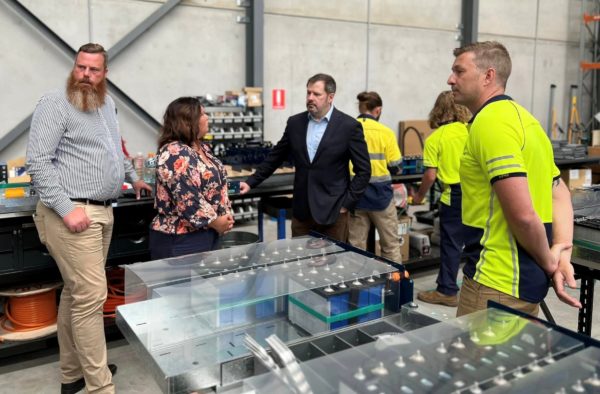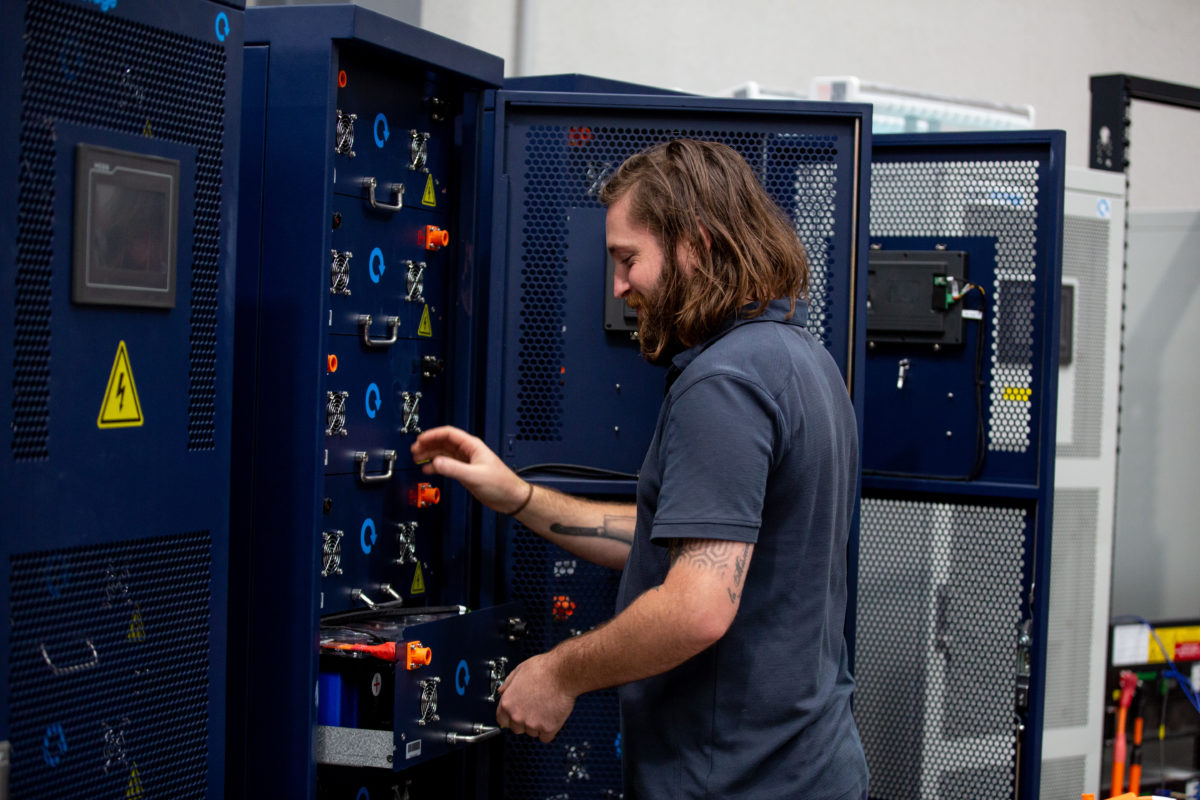With batteries a critical part of the world’s energy mix as the market becomes dominated by intermittent renewables, the Australian federal government has its sights set on ramping up Australia’s battery manufacturing capabilities, building on the nation’s competitive advantages in critical minerals and strong R&D capacity.
Industry Minister Ed Husic formally launched consultations for the National Battery Strategy during a visit to Energy Renaissance’s lithium-ion battery manufacturing facility, at Tomago in the New South Wales Hunter Valley.
“Our general approach should be one where if we mine it here, we should make it here,” he said.
“Large-scale uptake and manufacture of batteries will be vital transitioning to net zero. New battery capacity will help support grid-scale capacity, power our homes, and electrify our transport sector.”
Global demand for battery energy storage systems is forecast to increase “nine to 10-fold over the next decade” Husic said, pointing to modelling by Bloomberg New Energy Finance.
The United States-based analyst estimates that 387 GW of new energy storage will be added globally by 2030. In Australia, the energy market operator predicts that storage capacity will increase to 15 GW by 2030, ramping up to 61 GW by 2050.
“We know there is huge demand for energy storage to support the widespread uptake of solar generation by households, business and industry,” Husic said.
“That’s why it is important that we harness the opportunity to become a key player in battery manufacturing and export on the world stage.”
Australia has a strong position in the mining of battery raw materials, but the federal government has estimated the nation is only realising 0.5% of the value of global battery production, missing out on vital opportunities in refining and further downstream in the value chain.

Image: Dan Repacholi
Husic said expanding Australia’s battery manufacturing capability provides the country with a unique opportunity to be a world leader in an industry that will create jobs and attract investment.
Analysis delivered by professional services company Accenture shows there are an estimated 34,700 jobs and $7.4 billion (USD 5.12 billion) in value to be made in Australia from battery technology and industries.
“Australia has globally significant deposits of essential battery materials and strong local innovation and research capabilities. By drawing on these strengths, Australia can take its place in the profitable global battery supply chain,” Husic said.
The minister also suggested that developing domestic battery industries will offer opportunities for states and territories to secure their energy security on a local level without the need to rely on “costly and vulnerable” international supply chains.
The issues paper highlights the current reliance on a battery production supply chain that is geographically concentrated in China, warning that it is “complex and at high risk of disruption.”
“China currently holds the largest market share of battery production at most stages of the supply chain, particularly in the EV battery market,” the paper reads. “It accounts for about 75% of the world’s production capacity for battery cells, 70% of cathode capacity, and 85% of anode capacity.”
“The consultations around the strategy are designed to find ways to get our country manufacturing Aussie batteries,” Husic said. “A coherent, national approach to the development and uptake of emerging technologies won’t just deliver economic growth and jobs, but also help safeguard our national wellbeing.”
The federal government said it will now work closely with states and territories, and consult widely with industry, community and experts to shape the national battery strategy.
Husic said it will be “a tight consultation of about four weeks” with submissions to close on March 3, 2023.
This content is protected by copyright and may not be reused. If you want to cooperate with us and would like to reuse some of our content, please contact: editors@pv-magazine.com.









Hi guys,
I would be much happier if we all talked about prioritising batteries for EV’s. The cheapest storage by far for the grid is off-river pumped hydro. Off-river Pumped Hydro Electricity Storage (PHES) can be built faster than on-river, cheaper, safer, and with no ecological concerns about disrupting a fragile river system. Build PHES within a few dozen km of a river. Build it all at once – the upper and lower reservoir and turbine rooms all together so you’re done in 3 years. Off-river avoids expensive spillways for 1 in 500 year flash floods. When finished, slowly pump the water from the river. Cover in floating solar panels to reduce evaporation. Top up from the river every few months. Satellite topological maps show most continents have over 100 TIMES more sites than they need. Pick your best 1% and you’re done. Professor Blakers shows the world situation (after a brief Aussie introduction). http://youtu.be/_Lk3elu3zf4?t=986 It loses some water to evaporation, but only 1/5th the water of coal thermal plants!
See here: http://iopscience.iop.org/article/10.1088/2516-1083/abeb5b#prgeabeb5bs6
PHES can be really big or really small, like this one for Walpole, an Aussie town of 500. http://www.abc.net.au/news/2021-11-01/renewable-energy-fix-walpole-power-problems/100579700